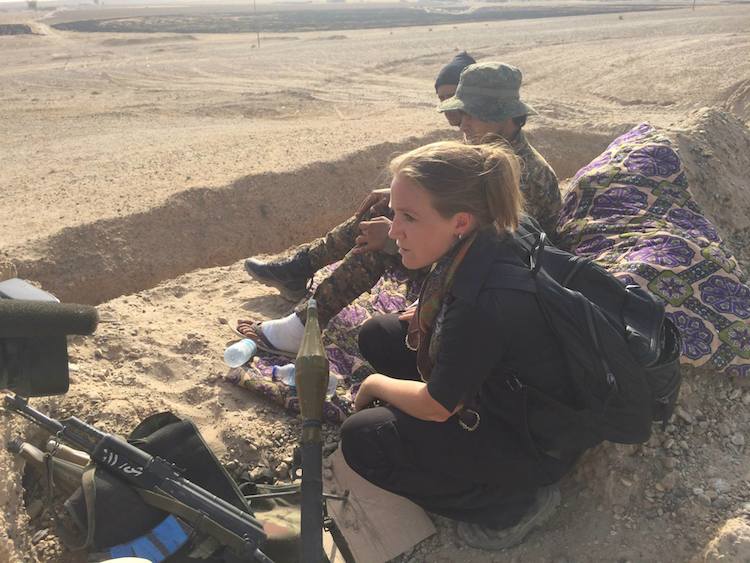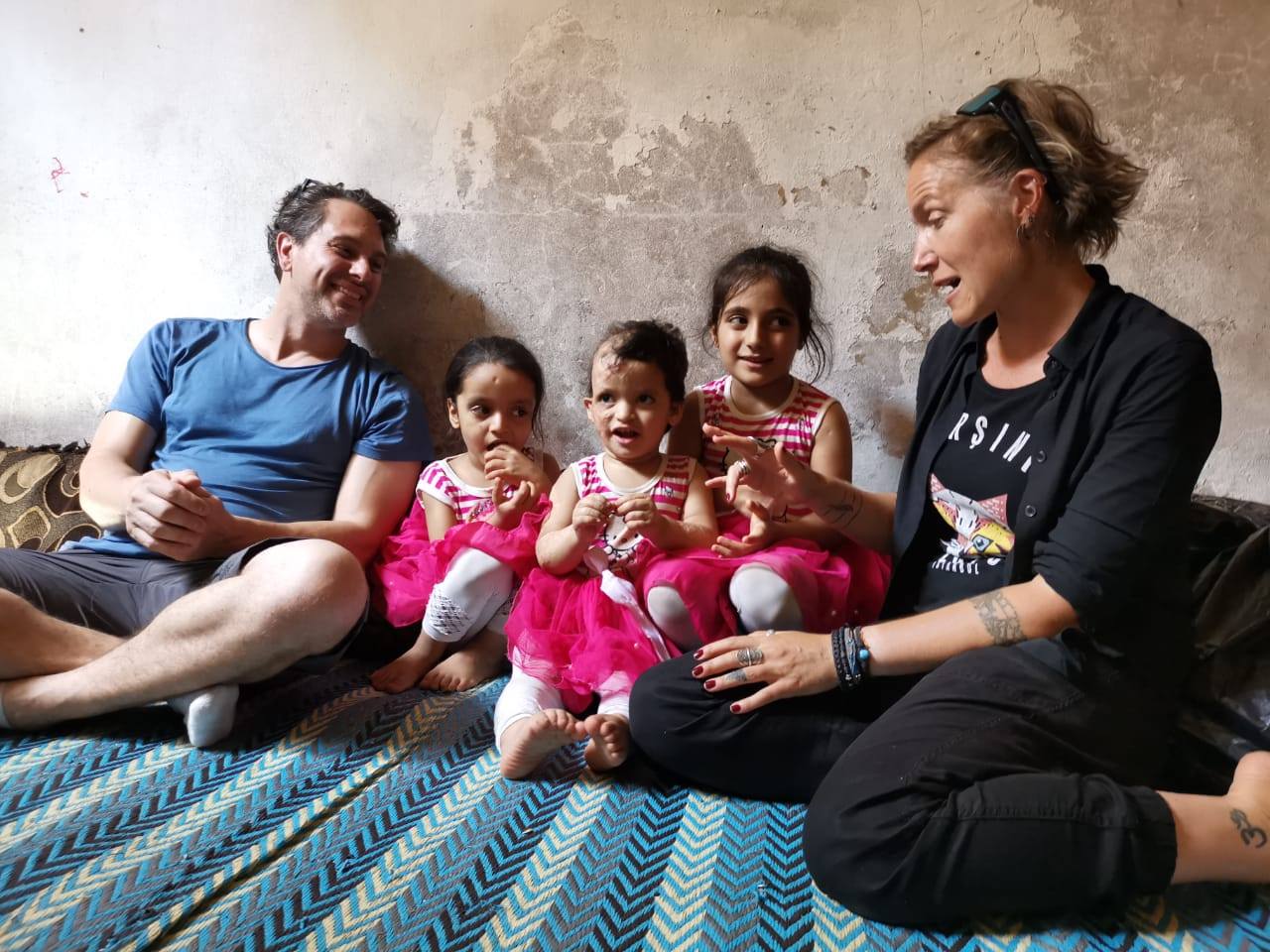In June 2022, Arwa Damon stepped down from her role as a senior international correspondent with CNN after 18 years of covering wars in Iraq and Syria. Arwa, who is an MCJN mentor, now focuses on her charity, INARA, which offers medical assistance to children impacted by wars. But she also continues to find new ways to tell stories through documentaries and innovative projects.
So how’s life after CNN?
It’s been okay, actually. Work has become more challenging now that I can no longer introduce myself as “Arwa Damon from CNN”. I miss having access to a lot of resources and contacts that can only be available when you work for a big organisation. I loved working for CNN and I do miss my colleagues, but I’m in a new chapter in my life right now and I want to tell stories in a different way.
I’m focussing on INARA as well as a new project entitled Amplify Voices, and I’m also on the road filming a documentary. It’s been both chaotic and exciting.
Can you tell us a bit about the documentary?
The documentary goes back to my core values as a journalist. I’m constantly looking for ways to tell people’s stories to a Western audience. Sadly, there is a lot of apathy towards refugee and war stories nowadays. In the documentary, a group of refugees from different countries go on an adventure to the summit of Mount Kilimanjaro. They’re all strangers to one another, but they do share a common experience of exile. By taking on this extraordinary task of reaching the summit of Mount Kilimanjaro, they bond together and it’s a way to unveil their stories.
I wanted to tell the story that exists in refugee camps so that it will show up one day in the history records.
There’s an element of healing in it. I love being in nature and I find physical challenges to be healing emotionally. In my film, the challenge isn’t reaching the mountain’s summit, but for the participants to reach their own personal summits. They all discover new things about themselves on this adventure.
Your career is one that many women journalists would dream of. How difficult was it for you to make it into CNN in the first place?
I’m Syrian-American and I grew up mostly in Morocco and Turkey, so my upbringing was cross-cultural.
I was working in a Turkish textile company in New York when the attacks of 9/11 happened, and I saw that an already huge East-West divide was getting even bigger. Arabs were under attack, but I didn’t experience that because I look American.
Even prior to that, when I would speak with my American friends about what was happening in the Middle East, especially in places like Palestine which was still dominating the headlines at the time, they would listen to me and relate because I was an American to them. So when 9/11 happened, I felt the need to become a journalist because I knew that I could tell those stories and make them relatable to a Western audience. It all came from that naive, idealistic viewpoint that we all have when we’re starting out as journalists.
So I emailed my resume to CNN, NBC, ABC, anyone you could possibly imagine. Most of them didn’t reply, but some told me I need to get some experience first before I attempt to get on the biggest story of that time, which was the imminent US-led invasion of Iraq.
So I found a job with a small production company called Camera Planet to help them with the logistics to get their team into Iraq. I would call officials from the Iraqi Ministry of Information, and they liked talking to me because they saw me as a “Syrian sister”. Eventually, I also got myself a visa into Iraq, and I got there just before the invasion. But I was kicked out of Iraq just before the war started along with a number of other journalists.

I contacted CNN again but they still wouldn’t hire me. The only way I could return to Iraq was to take on another job as a sales representative for a company that sells portable toilets and flak jackets. The next time I landed in Baghdad, I went into CNN’s office and introduced myself, and finally got my first freelance assignment with them.
In the beginning, I was awful on camera, and when I watch my earlier reports I cannot understand how they even kept me on air! I had to work a lot on myself. At the time, we didn’t have a recording booth in our office in Baghdad, so I had to record my reports in front of everyone . It was humiliating and embarrassing but that’s how I learned.
How do you compare the challenges you’ve faced with the experiences of members from the Marie Colvin Journalists’ Network, some of whom you’ve mentored and supported?
Being female and working in a local network in our region today comes with a lot of challenges that I didn’t have to deal with, especially because I have an American passport and I could leave anytime.
Today, I see a growing sense of being demoralised when story ideas are rejected, either due to censorship or apathy. And I share that sentiment. I remember becoming demoralised when Syria disappeared from the news. I kept fighting at CNN to go there and continue reporting, and people would ask me what’s the point since the situation there isn’t changing.
There was a point in time when I was in a very dark place. I was trying to process complicated emotions, and the only way I could do so was through anger.
At that point, I had to shift my thinking. I was no longer going there to tell a story to make a groundbreaking difference. I wanted to continue telling the story because we can't let history be written by the victors. I wanted to tell the story that exists on the ground in the refugee camps if merely for the fact that it will show up one day in the history records.
So as journalists, we need to start recognising that what we do may not have a massive impact right now, but we have to make sure that the stories that we uniquely cover are also part of history’s records.
Many of our members are also part of the story themselves. They live through wars and violence, which impacts their mental health. Is that something you experienced as well?
There was a point in time when I was in a very dark place. I was trying to process complicated emotions, and the only way I could do so was through anger. I was in a destructive and toxic headspace. It affected a lot of my relationships and how I was dealing with the world outside of a warzone.
I felt guilty because I had the privilege of being able to leave a country after covering it. It felt crazy that I could go to a refugee camp where children are freezing without shoes, with bombs raining over their heads, do a story, and then return to Istanbul and have a warm shower. And it was only in the last five years that I was able to convert that guilt into a recognition that I should just be grateful for what I have. This is one of the reasons why I set up INARA which offers medical and mental health assistance to children impacted by wars. In a way, creating this charity to help children have better access to medical services also saved me.

And now you have a new project, Amplify Voices Alliance, which aims to tell the many stories that are left out from news coverage.
Journalists meet extraordinary people all the time, whose stories are worth telling. But the stories often don’t fit in with what a media network is looking for. Sometimes, the story doesn’t quite fit with the news that they’re covering that day, or there simply isn’t enough space for it.
So I created this website where journalists can submit stories that they haven’t been able to tell. They can also work with the person whose story they want to tell so that he or she can write the story in their own words. When we report the news, we often shorten or condense what people are telling us to fit into our news reports and this does “shorten” their emotions. So this project is meant to give people back the agency over how their story is being told.
But what about the audience? We know people are sometimes fatigued from hearing certain stories, so how can you make them interested again?
I’ll answer by giving you an example. We have a story on the website of an Egyptian man who’s living in exile. We’ve all read news about Egypt. But his story is not about the news. He has three daughters, the youngest of which was only 15 days old when he had to flee Egypt, and his family is now banned from travelling. So he wrote to us about what it means to be a father in exile. How do you define fatherhood in a situation like this, when you can’t be there and touch your children? So it’s the fatherhood angle that would resonate with many people.
Nevertheless, I believe that we shouldn’t only choose stories if they have mass appeal, because if you’re focussed on the masses then you’re going to exclude a huge amount of stories. I don’t care if it’s just one person out there who’s interested in this story. I want to put stories out there because there are people who want to be educated on these issues and they will find this resource and educate themselves.
